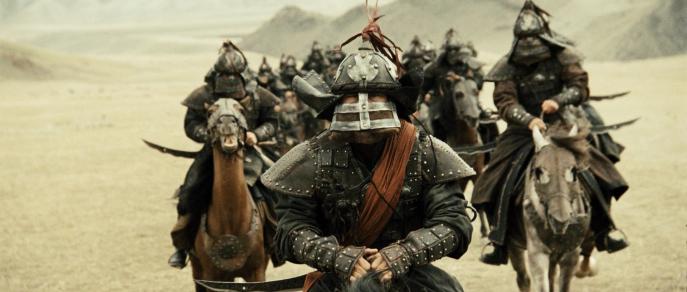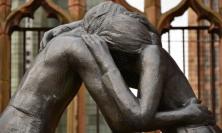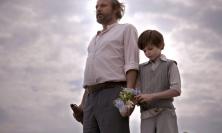Director: Sergei Bodrov
Starring: Tadanobu Asano, Odnyam Odsuren, Khulan Chuluun, Honglei Sun
UK Release date: 6 June 2008
Certificate: 15 (126 mins)
Rightwards revisionism is definitely a going concern. Enoch Powell wasn’t all bad. Mary Whitehouse had a point. The other morning, I even heard F. W. De Klerk on Today saying apartheid had something to be said for it. But these are small fry. What are the prospects for that truly iconic bogeyperson of fascism, Genghis Khan? Could he be up for rehabilitation too? Pretty unlikely, you might think. After all, secular liberalism has always needed hate-figures against which it can define itself and they don’t come much more terrifying , more Other (more oriental?) than he. If matters were left to the whiggish Richard Dawkins, never himself one to delve into the truth behind a stereotype, Genghis would certainly retain his unique status as the personification of unreconstructed, tyrannical barbarism (tellingly, the hammer of the pious thinks that Genghis makes Adolf Hitler look comparatively soft). And yet, the budding Kazakh film industry has just launched an epic blockbuster which sets out to defend the Great Khan’s humanity. Is it a sign of a sinister global lurch towards authoritarianism? Or is there reason to be heartened by this movie?
I, for one, left the cinema encouraged, for reasons educational, cinematic – and political. Like most of us, I didn’t actually know much about the man who, before he became “Genghis Khan” of the vast Mongol empire, was known as Temudgin. With the world getting smaller by the minute, it’s no bad idea to fill the more glaring lacunae in one’s knowledge of Asian history. This international production (as well as Kazakhs, there are Germans, Russians, Chinese, Japanese and, of course, Mongolians involved) brings us a flavour of this far-off world and of how it sees itself.
It’s a pretty enjoyable movie too. Visually handsome, the film sweeps us across the great desert plains, the hills and cities of the Steppes. When Temudgin tells his blood-brother that he acquired his fearlessness through having no place to hide, one senses that the courage for which his armies would be so feared could only have been learned in this barren, treeless landscape with nothing to keep those huge, harsh skies at bay. A fine feel for nomadic life comes through, as well. We are not fobbed off with a sterilised idyll of the orientalist imagination. The stench of animals and, indeed, humans is almost palpable inside those round, smoke-ridden tents, and there is a gritty realism to the shots of camp life with lashings of milk and hunks of raw flesh. (A small complaint: the dubbing is a touch enthusiastic; after two hours up close and personal with an sweaty, equine cast of a thousand snorting in your ears, it’s hard not to feel them dribbling all down your face.)
But it’s the politics which most interested me, for the film’s case is that Temudgin came to power not as a result of overweening ambition, nor even of revenge, but because his suffering had made him free from such things, free to be just and honourable in a world where virtue promises no reward. Perhaps the film is asking us whether we can relate to such a truth in our own lives or whether we feel obliged to take a detour to the East before it becomes accessible.
The narrative is straightforward. We first meet the nine year old Temudgin insisting, somewhat annoyingly for his father, Esugei, who has other plans, on choosing his own wife, the cheekily self-confident Borte. A few days later, on the journey home from the neighbouring tribe, Esugei is poisoned by his enemies in flagrant breach of Mongolian custom, which forbids the shedding of blood at a stopping place. This is a decisive moment in the plot, not only because it effectively orphans our hero but also because it establishes the question of ancient law and custom, a theme which is resolved towards the end of the film at the sanctuary of the lupine deity, Tengri, when the battle-hardened Temudgin is granted a semi-Mosaic dispensation for his new empire of the Steppes. We are being invited to see Temudgin’s great contribution to Mongolian civilisation as the enforcement of a basic and just legal code which appears to have fallen into decadence by the time he sets foot on the world stage.
As the boy grows up, he faces an array of enemies, held captive in a cangue by his nemesis, Targutai, beaten in battle by his blood-brother, Jamukha (a mercurial foil to the more serious Temudgin), and finally imprisoned in the foreign city of Tangut where he is caged and humiliated as one of the Mongols “who want to destroy our city”. It will be no surprise that the young man ends up as hard as nails, but the film teases us with the expectation that he must also have been brutalised, an expectation it takes great pleasure in shattering. What are we to make of this? Perhaps he owes his robust humanity, as so much else, to the one unmovable point of reference in his life, the enigmatic, faithful and bold Borte, played alluringly by the Chinese Khulan Chuluun, making here a remarkable acting debut. Chosen not, as Esugei would have had it, for her strong legs but because for her audacity in commending herself as a worthy bride, she manages to spend very little time with her spouse, at least in the years covered in the film but nevertheless a powerful bond unites them. In a moving moment, when it becomes apparent that she is pregnant by one of her abductors, Temudgin places his hand over the unborn child and avows it to be “my son”. His fortitude, bolstered by her devotion, issues consistently in resolute mercy and adherence to his self-assumed code of honour.
One may wonder, of course, how much of all this is an accurate portrayal of the man Mongolians still venerate as the embodiment of their national identity. Most of it is at least based on legend, though a poignant part of the narrative, the incident during his imprisonment in Tangut in which a Buddhist monk undertakes a fatal journey on behalf of Temudgin, is purely speculative, inserted to plug a ten year gap in Temudgin’s life story. But that need not be a cause for concern. The unprecedented equality of his relationship with Borte does seem to be rooted in fact and I would aver that the many sprays of blood which spatter the battle scenes are not far from accurate either. Inevitably, the cinematic style is marked by contemporary trends in film-making; Tuomas Kantelinen’s lyrical score, for example, evocative and unobtrusive, sensitively coherent with the more indigenous sounds of a Mongolian folk-rock group, is also derivative, I thought, of The Lord of the Rings, as are some of the battle scenes. The filter of western culture is, of course, decisive but then the message is meant for us.
Arguably the film is a little long and the last ten minutes jarred slightly on the narrative pace. The script is on the wooden side, though, who knows, maybe it sings if you understand Mongolian. But what makes the film worth going to see is that next time you feel exasperated by New Labour, you might just find yourself hesitating before describing a cabinet minister as “slightly to the right of Genghis Khan”. It offers a corrective to a smug, self-congratulatory liberalism which needs to learn that fidelity to the best of an ancient code, enlivened by a new rigour, generosity and selflessness is not necessarily a way of proceeding totally foreign to the best instincts of the West.
Damian Howard SJ






